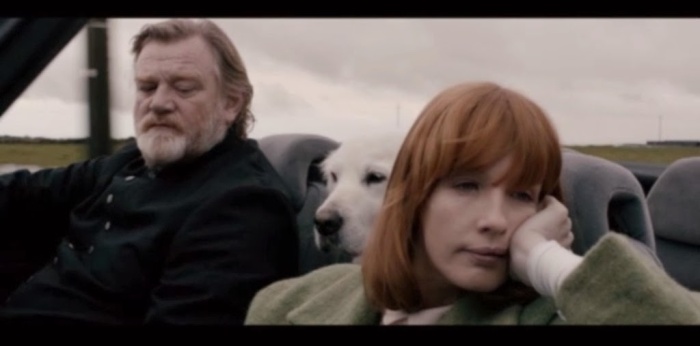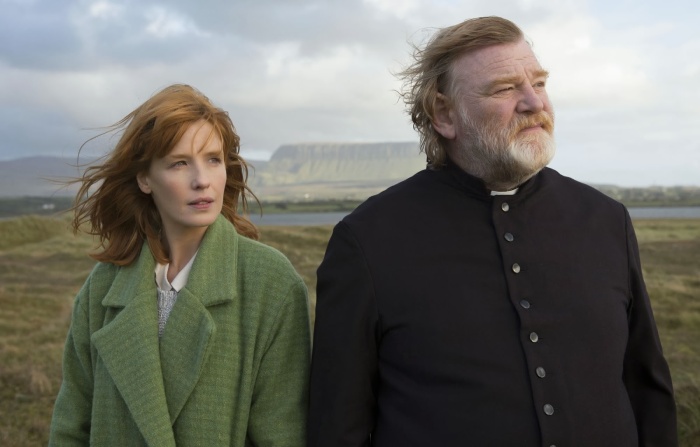Calvary is the new Brendan Gleeson vehicle from John McDonagh. Independent cinema makes it possible to write “Brendan Gleeson vehicle,” a state of affairs that allows us to enjoy the acting chops of the rudy Irish gentleman outside of the usual supporting roles for burly foreigners. Another delight of independent cinema is watching the McDonagh brothers square off yet again. Unlike America’s codependent Coens, the McDonagh brothers seem to be involved in a rivalry that started when one had the gall to make the darkly comic ‘In Bruges’. John McDonagh responded with the Gleeson led ‘The Guard’, a slightly lighter look at law enforcement. The second films from each brother demonstrates an interesting flip in tone. Martin’s ‘Seven Psychopaths’ lightens up on the brooding and digs into a neurotic Charlie Kaufman-esque story, while John’s new film Calvary goes to a very dark place, which should be obvious if you’re aware of the religious origin of this term. If you’re willing to come up on that hill, you’ll be treated to a very thorough examination of the relationships between men and religion and modernity, which doesn’t lean on miracles or maudlin sentiment for easy answers.
 |
| Despite Gillen’s presence, much less pimping than you might expect |
Gleeson plays Father James, an Irish priest who operates in a small satellite community full of eccentrics. Right from the opening shot in the confession booth we learn that someone in town wants to kill Father James in a week to make a statement, although we do not learn who. This isn’t a mystery film though as only the audience is left in the dark; Father James reveals a little later he knows exactly who it is. The resulting effect is that as we follow Gleeson through this week we are sensitized to the hostility towards organized religion pervasive in the community. The disgruntled township is made up almost exclusively of sneering faces and barbed rejoinders, played by many familiar faces such as Emmet Walsch, Aillin Gillen, Chris O’Dowd, and Kelly Reilly. John McDonagh dispenses with any faithful here (besides, perhaps, Father James), to such a degree that even James’ own daughter asks him not to lay all of that God stuff on her. This small Irish village is not a bastion of conservatism, but instead represents a world that is increasingly agnostic in the face of an increasingly irrelevant Catholic church. One of the few congenial characters is openly, perhaps defiantly, homosexual, presenting his boyfriend to Father James. These elements could suggest Calvary is therefore just another portrait of tradition’s subversion, but Father James is not a fundamentalist and he never takes a conservative stance. Instead the conversations that Father James has with the township are more about personal relationships with faith and the meaning of a moral life. Calvary is really about our current feelings on sacrifice and hardship in a life directed by an inscrutable God, and how the teachings of Christ fit into the modern world.
 |
| Damn, no public restrooms |
Though it may be contemplative, Calvary is also quite dark. It has neither the blind optimism of Davy and Goliath nor the protective sheath of sarcasm worn by parodies like Moral Orel or South Park. Its earnest indulgence in pain makes it thematically closer to Passion of the Christ. Father James endures open offences to the church he represents. Opinions are freely spoken to him in mockery or insolence. The people we see, even the mysterious killer, have nothing specifically against Father James but take the Catholic relic as an affront. Paradoxically, the motivations of Father James are completely benevolent. He seeks to provide solace, which frames his discussions about religion as the agnostic townsfolk bluntly question the value of the ancient institution. Is religion a net good? What does forgiveness really mean and what is the benefit? Calvary presents an exploration of these tradition religious tensions in the context of a modern rational society. Even Father James’ faith is questionable, which may well have been the focus of a more traditional religious story but does not hold much significance here. Calvary isn’t really about God, it’s about the relationship between people and the role faith plays there.
 |
| In dog we trust |
Many of these exchanges are oblique. Father James converses in the local dialect, not as a philosopher, and only gently pushes people towards his view. The McDonaghs are deft hands with scripting, so rarely does the heaviness of the material bog down the dialogue. Humorous moments abound, along with some of the striking vistas of Ireland that must make faith a little more palpable. Additionally the ever present hostility keeps the tension ramped. Some of the community seems rabid and Father James is boisterous himself. With the omnipresent search for the hidden killer, it will keep you guessing moment to moment. If anything, the biggest issue with the film is probably that it’s a little too rigorously constructed to create this pressue cooker. It shares this weakness with another great film about faith and men, ‘Doubt’, which always seemed like it never quite left the stage behind. The small hamlet in Calvary serves McDonagh a little too deliberately, although this is a common issue for parables.
Calvary is a trim fast paced film that cracks open contemporary pondering on religion. If you enjoy a scowling Gleeson or any of the McDonagh brother’s other films then Calvary will be enjoyable. Especially for those not particularly religious, Calvary’s notions on forgiveness and solace should prove thought provoking, questioning how much of religion is faith based and how much is humanist philosophy.
3/4
Originally published on Synthetic Error October 2, 2014

Comments
Post a Comment